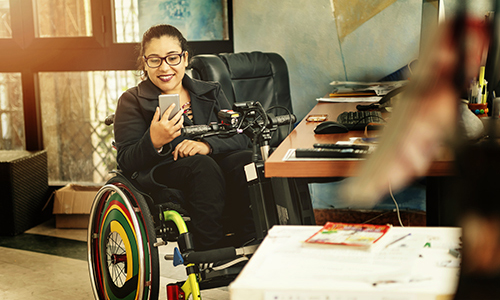For the survivor of a spinal cord injury, returning to work may, at first, seem an impossibility. But recent statistics show employment figures for those with a spinal cord injury are near to that of the general population.
As life events go, few have a more traumatic impact on day-to-day living than spinal cord injury. Even after successful spinal cord injury rehab, coming to grips with the fact that one’s life has been forever altered is not easy. Depression is often part of this process until one accepts their unique situation and decides to move on with their new life.
One of the best ways to do this is by working.
Working offers us a sense of self-worth, not to mention a means to provide, friendships and workplace camaraderie, and the feeling of accomplishment that comes from being part of a team. This is especially so for those whose lives have been altered by an SCI.
Surprisingly, a recent study shows that of spinal cord injury survivors, 60% of them work full or part-time, whereas the number for those same people before injury was just 75%. In fact, this rate of employment compares to the national average for people without disabilities.
There are many reasons for this, but one of the primary ones is the opportunities presented as a result of new technologies and jobs that can be performed online. Computer skills enable those with an SCI enormous flexibility in terms of scheduling, where and how they work, whether that be from home, onsite, or a combination of both.
Further, online technology facilitates ongoing education for those spinal cord injury survivors who wish to learn new skills through training and education programs. Did you know that people with an SCI actually obtain a higher level of education than that of the general population? Not only does this enhance employment opportunities, it provides those with an SCI an expanding network of supportive relationships, both personally and professionally.
Of course, this is not to suggest that working with an SCI does not come with its own challenges. It does. Many, if not most, spinal cord injury survivors will require at least some level of modification or accommodations to the places they work. But here, too, you may be surprised to discover that, according to the study, 90% of those working with an SCI have reported no problems receiving the accommodations they requested of their employer.
Another potential challenge is the fear that, by working, one with an SCI may lose one’s disability benefits. Given the high costs associated with SCI and its care, losing these benefits could be devastating – and more than offset the benefit from being employed. The good news is that there are solutions for these types of scenarios – which are best discussed with your social worker or financial advisor.
Working is a normal and rewarding part of life. This goes double for those with an SCI. It keeps one active and busy, and helps to improve one’s physical health and sense of well-being. There is no reason it can’t be part of yours.
References:









